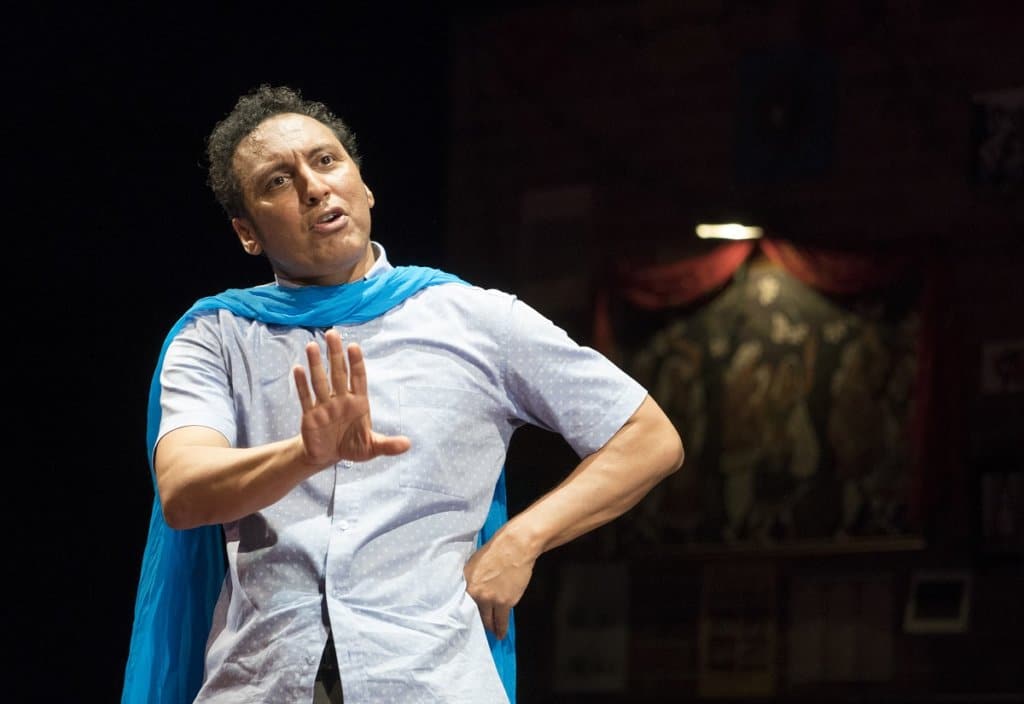In 1998, Aasif Mandvi sent his one-man play “Sakina’s Restaurant” out into a very different world.
It was before the twin towers fell and Muslims had to contend with terrorist stereotypes. Before immigration became a hot-button political issue. Before questions of representation were quite so central to the cultural conversation.
The play in which Mandvi assumes many characters — from a young Indian immigrant to the proprietor of the restaurant where he works — marked the beginning of his career as an actor. It was before he gained national prominence as a correspondent on Comedy Central’s “The Daily Show”; starred in the Pulitzer Prize-winning play “Disgraced”; or produced, co-wrote and starred in the HBO series “The Brink” opposite Jack Black and Tim Robbins.
Now, 20 years later and a recently married at 52, he is sending “Sakina’s Restaurant” back out into the world, where it opens Sunday at the Minetta Lane Theater.
When audiobook publisher and retailer Audible, which is producing the play and will offer it as a recording, asked Mandvi to revive it, he was initially skeptical.
“As I unpacked it again,” he said during a recent break from rehearsals, “I began to see that it’s perhaps relevant in a whole new way than it was back then.”
At its core, he added, “it is a story of an immigrant family — their heartbreaks, their joys — and it is a story about what it means to be an American.”
To be sure, this was more measured than what Mandvi later posted on his Instagram account as his first preview approached: “I never thought that 20 years later the story I wrote about an immigrant family would be an act of political resistance against an administration that is at war with immigrants.”
Audible, which last year started a theater initiative to produce and release audio versions of plays, wanted Mandvi to leave “Sakina’s Restaurant” as is.
“It’s so timely still,” said Kate Navin, Audible’s artistic director. “It’s a political piece without being political.”
Indeed, the play — originally directed and developed by Kimberly Hughes under Wynn Handman, the artistic director of the American Place Theater — remains largely intact. Kimberly Senior, who directed this production and has grown close to Mandvi since overseeing “Disgraced,” said the show has a poignancy in today’s context.
“The innocence of the piece and its optimism is something I personally feel in mourning for in America,” Senior said. “It’s a haunting reminder of our potential.”
Despite increasing diversity efforts in the arts, Mandvi said his “Sakina’s Restaurant” role is “a part actors of color rarely get to experience.” That’s why he created it in the first place.
Born in Mumbai and raised in England and Florida, Mandvi said he spent his youth doing monologues from “Death of a Salesman” or plays by Eugene O’Neill. “I was always aping white culture, because most theater is about white people,” he said.
“Sakina’s Restaurant,” he added, “came out of my bones.”
While he amassed many film and television credits, Mandvi wouldn’t go so far as to say the two decades since its launch have brought him all he wanted in a career. “I never thought I would get this far — I’ve worked with some remarkable people,” he said. “But there is always an aspiration to do more.”
He has developed projects that never saw the light of day. He didn’t move to Broadway with “Disgraced” because he was working on “The Brink,” which then got canceled.
“We are still in the world where, when you are a person of color, it is considered diversity,” he added. “’We already have an Indian Muslim story being told over here, so we can’t have another one.’ Having said that, we have come a long way.”
Just as the times have changed, so has Mandvi. “Can I physically do it again?” he said he asked himself. “Twenty years ago, I was 20 years younger, and it was exhausting then.”
Yet he has clearly grown more comfortable as a performer. “I like to think that I’m a better actor today than I was then,” he said, “just because of the life experience.”
That includes finally getting married, a year ago, to Shaifali Puri, a former nonprofit executive. “When you are 50, people are not happy for you, they’re like, ‘Why?’” Mandvi joked. “’Do you have cancer? Does she have cancer? Who has cancer?’”
Mandvi said he and Senior have made nips and tucks to streamline the play’s storytelling. But while they tweaked some moments to make it “crackle and feel present in today’s world,” they have left the 1990s time period as is, with all its dated signposts, like cordless phones and Game Boys.
As a result, the whole experience of revisiting the play has been an exercise in nostalgia, Mandvi said, taking him back to a time when he sold brownies at intermission to earn rent money, had to settle for roles as an Indian cabdriver and could not imagine that he’d someday be recognized on the street.
“’Sakina’s Restaurant’ was when everything started for me,” he said. “This feels like a return.”
c.2018 New York Times News Service
